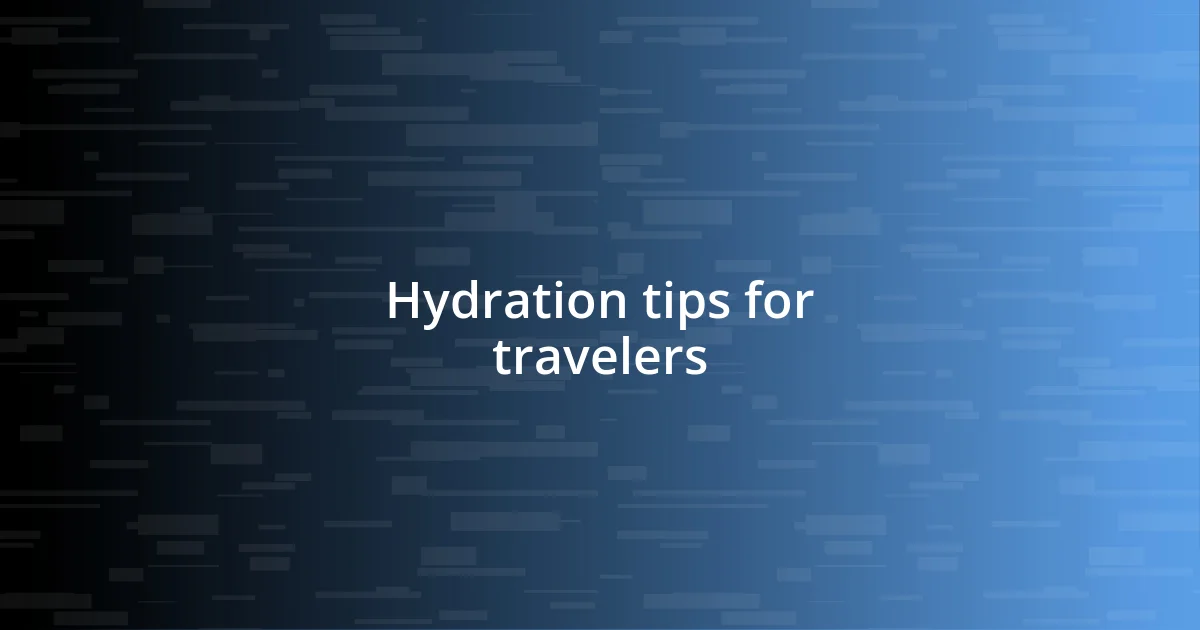Key takeaways:
- Jet lag symptoms include disorientation, fatigue, and mood swings, influenced by time zone changes, sleep disruption, and travel stress.
- Prioritizing sleep before travel and adjusting sleep schedules can significantly mitigate jet lag effects, enhancing energy and mood.
- Hydration and proper light exposure upon arrival help reset the body’s internal clock, reducing fatigue and improving travel experiences.

Understanding jet lag symptoms
Jet lag manifests in various symptoms that can take a toll on both your body and mind. For me, it often starts with a sense of disorientation; I can be sitting on a beach, yet my brain feels foggy and disconnected. Have you ever felt like you were in a different time zone mentally, even if you weren’t physically?
As the days of travel add up, fatigue becomes almost a constant companion. I recall a time when I arrived at my destination, ready to explore, only to find myself yearning for a nap before I’d even unpacked my suitcase. It’s frustrating, isn’t it? Feeling like you’re missing out because your energy levels are in a constant state of decline.
Mood swings can creep in as well, leaving you irritable and on edge. It’s interesting how something as simple as a flight can throw off your emotional state. I often wonder if others experience this too—one moment I’m exhilarated by the adventure ahead, and the next, I’m grappling with frustration over the smallest things. Understanding these symptoms helps me better prepare for my travels and manage expectations along the way.

Factors contributing to jet lag
Jet lag can be a real hurdle for travelers, and its roots lie in several key factors. I’ve noticed that crossing multiple time zones disrupts my circadian rhythms—the internal clock that regulates my sleep-wake cycle. When I flew to Japan for the first time, I arrived in the morning but felt entirely unready to take on the day. It was as if my body was on a completely different schedule, refusing to align with the vibrant Tokyo energy around me.
Here are some major factors that contribute to jet lag:
- Time Zone Changes: Altering your daily cycle by several time zones can confuse your body.
- Sleep Disruption: Often, the quality and quantity of sleep during flights are subpar due to cramped seating and noise.
- Light Exposure: Different levels of natural light in new places can impact melatonin production, further complicating your body’s adjustment.
- Hydration Levels: Air travel can lead to dehydration, which affects energy levels and mental clarity.
- Travel Stress: The stresses of navigating airports and adjusting to new places can heighten feelings of fatigue.
It’s fascinating to observe how these elements intertwine, creating a perfect storm for jet lag. I remember distinctly hiking in the hills of San Francisco after a long flight, only to feel utterly drained just ten minutes in—my brain was still on “travel mode” while my body attempted to adjust.

Importance of sleep before travel
The quality of sleep before embarking on a journey can’t be overstated. In my experience, a restful night sets the foundation for my travel experience. I remember a trip to Europe where I ensured I got a full eight hours of sleep before my flight. Arriving at my destination felt like a fresh start rather than a draining ordeal. It’s as if my body was equipped to tackle the day, eager to soak in new sights instead of battling fogginess.
Moreover, sufficient sleep prepares my mind for the inevitable excitement and challenges of travel. Have you ever noticed how a restless night can make even the smallest obstacles feel overwhelming? On a road trip to a festival, I skimped on sleep and found myself feeling irritable over minor inconveniences, such as waiting in a long line. The experience taught me that sleep serves as my emotional shield—it cushions me against the stressors that come with travel.
I’ve also learned that adjusting my sleep schedule a few days before a trip can ease the transition. If I’m heading to a new time zone, shifting my bedtime can help my body acclimate more smoothly. A few years ago, I traveled to Australia and began adjusting my sleep in advance. By the time I landed, I felt surprisingly alert! It’s an approach I now swear by.
| Sleep Quality | Impact on Travel |
|---|---|
| High Quality | Increased Energy, Enhanced Mood |
| Poor Quality | Fatigue, Irritability, Difficulty Adjusting |

Hydration tips for travelers
Staying hydrated while traveling is crucial to feeling your best, especially when battling jet lag. I’ve learned that sipping water consistently during flights helps keep my energy levels stable. On a recent trip to South America, I made it a habit to drink a glass of water every hour, which surprisingly made a significant difference in how I felt upon arrival.
Airplane cabins often have low humidity, which can easily lead to dehydration. I remember feeling sluggish and foggy-headed after one long flight because I hadn’t prioritized my water intake. Now, I set reminders on my phone to take small sips throughout the journey. This simple act keeps my mind sharp and reduces that overwhelming fatigue that can hit once you land in a new time zone.
When I arrive at my destination, I usually boost my hydration with electrolyte-rich drinks. After a grueling overseas flight, it’s refreshing to drink something that not only quenches my thirst but also replenishes lost minerals. I often opt for coconut water or a light sports drink, especially after a long-haul flight. Have you ever felt revived from just a single refreshing sip? It’s incredible how these small choices can elevate your travel experience and help combat the worn-down feelings of jet lag.

The role of light exposure
The role of light exposure
Light exposure plays a surprising yet pivotal role in combating jet lag during travel. I recall a trip to Japan where I deliberately soaked in natural sunlight upon arrival. It was refreshing to feel the warm rays on my skin, effectively signaling to my body that it was time to adapt to the new time zone. Have you ever noticed how a sunny day can instantly lift your spirits? In that moment, the vibrant light acted as my ally in overcoming fatigue.
When I travel, I’ve learned that morning light is particularly beneficial. It boosts my alertness and helps reset my internal clock. I remember waking up early during a recent trip to Spain, eagerly stepping outside to bask in the first light of day. That simple act not only invigorated me but also shifted my circadian rhythm, allowing me to fully enjoy the local culture. It’s fascinating how something as simple as sunlight can influence our body’s natural rhythms.
On the flip side, I’ve also been mindful of avoiding exposure to bright screens at night when navigating new time zones. During a late-night arrival in New York, I made it a point to turn off my phone and dim the lights, creating a serene environment for sleep. This approach not only made falling asleep easier but helped me wake up feeling more refreshed the next day. Isn’t it interesting how our surroundings can drastically shape our travel experience? Light truly is a guiding force in adjusting to new rhythms.

How to adjust your schedule
Adjusting your schedule is one of the most effective strategies I’ve discovered to fend off the jet lag monster. Before my trip, I try to gradually shift my sleep and meal times closer to those of my destination. For example, when heading to Asia, I’ll start going to bed an hour earlier each night, and honestly, at first, it feels a bit challenging. Have you ever tried to sneak in an extra hour of sleep only to find your body unwilling? Yet with patience, I find my body starts to adapt, and that’s incredibly rewarding.
Once I reach my destination, I focus on the local time without hesitation. I remember one particular trip where I arrived in Sydney early in the morning after a long flight, and instead of crashing, I embraced the day. I explored nearby cafes and engaged with locals, soaking in the wonderful energy of the city. In that moment, while sipping a flat white and gazing at the harbor, I felt alive! Why waste valuable hours in slumber when the world is just outside your door, waiting to be experienced?
It’s also vital to avoid naps longer than 20-30 minutes on arrival. I learned this the hard way after one oversleeping episode left me awake at 2 AM, staring at the ceiling. Now, I set a timer if I feel the need to rest. Those brief, strategic snoozes can be rejuvenating, but I’ve realized that too much sleep—even if it feels tempting—can throw my body further off balance. Isn’t it funny how sometimes the things we crave most can be the very things that derail our plans?












